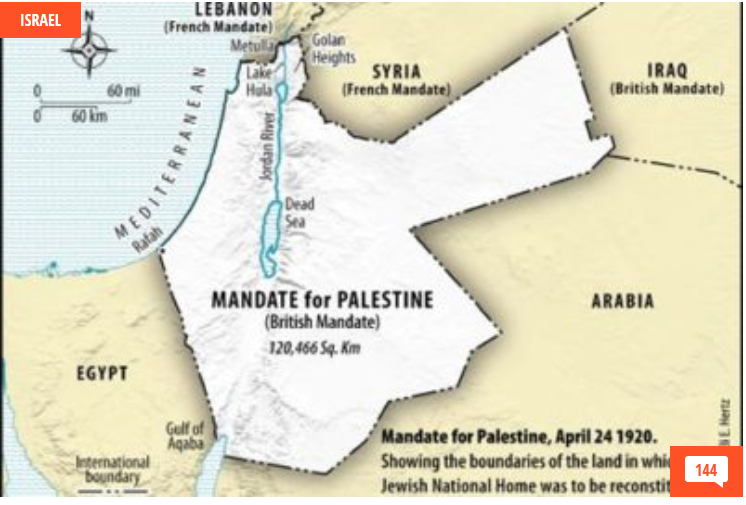The idea that Israel belongs to anyone except the Jews does not hold water historically. The British named the area of Israel Palestine as an insult to the Jewish people who lived there–it had nothing to do with there being a state of Palestine. Such a state never existed.
This is the picture of the land given to Israel in 1920:
 The majority of that land that was originally given to Israel was given to Jordan. After the war in 1948, the Armistice Agreements left Jordan in control of the West Bank. In 1950, Jordan annexed the West Bank and gave all residents Jordanian citizenship. Until the 1967 War, the people living in the West Bank were considered Jordanian citizens. As I have noted in previous posts, Walid Shoebat stated, “One day during the 1960s I went to bed a Jordanian Muslim, and when I woke up the next morning, I was informed that I was now a Palestinian Muslim, and that I was no longer a Jordanian Muslim.”
The majority of that land that was originally given to Israel was given to Jordan. After the war in 1948, the Armistice Agreements left Jordan in control of the West Bank. In 1950, Jordan annexed the West Bank and gave all residents Jordanian citizenship. Until the 1967 War, the people living in the West Bank were considered Jordanian citizens. As I have noted in previous posts, Walid Shoebat stated, “One day during the 1960s I went to bed a Jordanian Muslim, and when I woke up the next morning, I was informed that I was now a Palestinian Muslim, and that I was no longer a Jordanian Muslim.”
So where am I going with this? Pamela Geller posted an article on her website on January 12 about a court case in the Court of Appeal of Versailles France.
The article reports:
…the Court of Appeal of Versailles ruled that West bank settlements and occupation of Judea Samaria by Israel is unequivocally legal under international law, in a suit brought by the Palestinian Authority against Jerusalem’s light rail built by French companies Alstom and Veolia…
Somehow the major media did not report this ruling.
The article includes a detailed analysis of the case and the reasons for the decision. I will try to summarize the highlights here:
In order to rule whether the light rail construction was legal or not, the court had to to seek the texts of international law, to examine international treaties, in order to establish the respective rights of the Palestinians and the Israelis.
And to my knowledge, this is the first time that a non-Israeli court has been led to rule on the status of the West Bank.
…Keep in mind though, that the Court’s findings have no effect in international law. What they do, and it’s of the utmost importance, they are clarify the legal reality.
The Versailles Court of Appeal conclusions are as resounding as the silence in which they were received in the media: Israel has real rights in the territories, its decision to build a light rail in the West Bank or anything else in the area is legal, and the judges have rejected all the arguments presented by the Palestinians.
The article lists the Palestinian arguments:
- The PLO denounces the deportation of the Palestinian population, and the destruction of properties in violation of international regulations. Relying on the Geneva and Hague Conventions and the UN resolutions, it considers that the State of Israel is illegally occupying Palestinian territory and is pursuing illegal Jewish colonization. Thus, construction of the light rail is itself illegal (1).
- The PLO adds that the light rail construction has resulted in the destruction of Palestinian buildings and houses, the almost total destruction of Highway 60, which is vital for Palestinians and their goods, and has conducted many illegal dispossessions. Therefore, several clauses from the annexed Regulations to the October 18, 1907 Fourth Hague Convention were violated (2).
- Finally, the PLO alleges that Israel violates the provisions relating to the « protection of cultural property » provided for in Article 4 of the Hague Convention of 14 May 1954, Article 27 of the Hague Regulations of 1907, Article 5 of the Hague Convention IX of 1907, and Article 53 of Additional Protocol No. 1 to the Geneva Conventions.
The article explains why these are not valid arguments:
The Court explains that the Palestinian Authority misinterprets the texts and they do not apply to the occupation:
- First of all, all the international instruments put forward by the PLO are acts signed between States, and the obligations or prohibitions contained therein are relevant to States. Neither the Palestinian Authority nor the PLO are States, therefore, none of these legal documents apply.
- Secondly, said the Court, these texts are binding only on those who signed them, namely the « contracting parties ». But neither the PLO nor the Palestinian Authority have ever signed these texts.
Please follow the link to read the entire article. The 1967 lines were not borders–they were lines drawn in an armistice. Remember also what has happened in the Gaza Strip since Israel gave it up–it has become a launching pad for sending rockets into civilian areas, and all of the income-producing greenhouses were destroyed because they had been owned by Jews. That kind of hatred is not anything the world needs to encourage.
It will be interesting to see what the implications of this court case will be. First of all, will any of the major media report it? Second of all, will this impact any decisions made at the United Nations regarding a ‘two-state solution.’ Again, I would like to note that until the people involved in the ‘two-state solution’ are willing to acknowledge Israel’s right to exist, the ‘two-state solution’ is not a recipe for peace, but only an excuse for more war.
